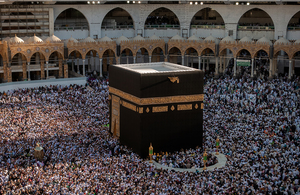The UK Health Security Agency (UKHSA) and the National Travel Health Network and Centre (NaTHNaC) are issuing their annual reminder to those embarking on Hajj and Umrah journeys to be aware of infectious diseases which may spread in large gatherings. Pilgrims should remember the possibility of rarer, but serious, diseases such as MERS-CoV and meningitis and ensure they are vaccinated.
The TravelHealthPro website, supported by the UK Health Security Agency, offers guidance for pilgrims attending these events.
MERS-CoV is a respiratory virus that spreads from animals, especially camels, to humans. It can also spread from person-to-person. The virus causes fever, coughing, and breathing difficulties. Although UK residents travelling to the Middle East are at low risk, travellers are advised to avoid consuming raw or undercooked animal products and refrain from contact with camels and animal wastes. Pilgrims should also practise good hygiene washing their hands regularly with soap and water, particularly after exposure to farms, barns, and market areas, to minimise the risk of MERS-CoV as well as other infections.
Due to previous meningitis outbreaks in Saudi Arabia, UKHSA is also advising pilgrims of the dangers of this disease. Meningococcal disease is rare but very serious and requires urgent hospital treatment. It is caused by meningococcal bacteria which can cause meningitis (inflammation of the lining of the brain) and septicaemia (when the bacteria enter the bloodstream to cause blood poisoning). All visitors aged over one year arriving for Umrah and Hajj should ensure they have received the MenACWY vaccine in the last 3 to 5 years.
In addition to these specific precautions, pilgrims should ensure that they and their family are up to date with all their routine vaccines.
While abroad or on returning to the UK, pilgrims should monitor for symptoms like fever, coughing, or difficulty breathing. Pilgrims should seek medical assistance if symptoms arise during the pilgrimage or contact a GP or NHS 111 if symptoms develop within 14 days of leaving Saudi Arabia or the Middle East. Recent travel history and any contact with someone having respiratory symptoms, healthcare facilities, or camels should be mentioned.
Be aware of signs and symptoms of meningitis or septicaemia (see Meningitis Now or Meningitis Research Foundation and if you become worried abut your own or some else’s health contact NHS111 or dial 999 in an emergency. If you develop these symptoms or an eye infection in the days after you return from Saudi Arabia please ensure you mention your recent travel.
Dr Angie Lackenby, Lead for MERS-CoV at UKHSA, said:
To reduce the risk of MERS, we strongly encourage travellers to avoid contact with camels and camel products in the Middle East, and to prioritise hand and respiratory hygiene to reduce the risk of infections spreading. Also, parents should ensure children travelling are up to date with their vaccinations, especially meningitis.
Returning pilgrims from Hajj and Umrah experiencing symptoms within 14 days of leaving Saudi Arabia should contact their GP or NHS 111 without delay and inform them of your recent travel history.
Dr Dipti Patel, Director of NaTHNaC, said:
Our comprehensive fact sheet offers vital information on health regulations, vaccine requirements and recommendations, and general health advice for Hajj and Umrah pilgrims. Please adhere to our guidance for a safe journey.
Dr Salman Waqar, GP and President of the British Islamic Medical Association, said:
We wish all pilgrims a safe and successful trip. Adhering to public health guidance on staying safe and healthy will help facilitate an easier Hajj. Travellers are especially reminded to observe good hand hygiene, have up to date vaccinations, and where necessary discuss the management of pre-existing conditions with their medical teams before departure.


















